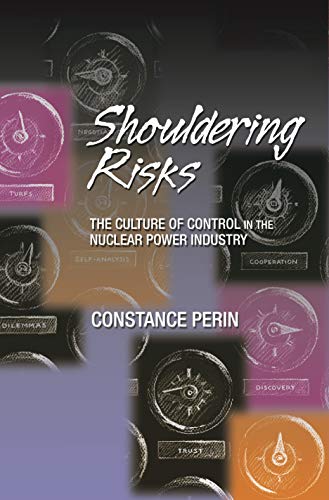
Inhaltsangabe
At the world's some 440 nuclear power plants, experts continually monitor their wide safety margins, and at signs of trouble seek out the sources and recommend changes. Too often for their comfort, and for ours, a subsequent problem reveals that these changes were ineffective or never made. Why this self-defeating pattern? What in this technology's culture of control might undermine experts' best intentions? What kind of problem is it to reduce operating risks?
Following brief highlights of this industry's history over the last twenty years of accidents, near-accidents, and institutional changes,Shouldering Risks presents excerpts from interviews with some sixty experts about four relatively recent events at three U.S. plants. Drawing also on her earlier field studies at eleven plants in America and abroad, on industry documents, and others' research, Constance Perin identifies unacknowledged elements in this industry's culture of control; for example, control concepts for reactor design, construction, and regulation carry over to risk handling and event analysis, whose efficacy depends instead on recognizing and interpreting the significance of technical and contextual signals on daily display.
Far more than the sum of its parts, this highly knowledge-dependent technology operates along an axis of meanings, not only along an axis of functions. A culture of control is, like any culture, an intricate system of claims about how to understand the world and act in it. Here, claims pivot around the dynamics of control theory and productivity based on particular assumptions about the relationships of humans to machines, models to reality, certainty to ambiguity, rationality to experience. These four events and accident analyses show that such assumptions can confound control and produce misleading meanings.
Shouldering Risks reimagines a broader and deeper culture of control to reshape our understandings of the intellectual capital appropriate to designing, regulating, organizing, and managing this risky enterprise and, perhaps, other such technologies already here or to come.
Die Inhaltsangabe kann sich auf eine andere Ausgabe dieses Titels beziehen.
Über die Autorin bzw. den Autor
Constance Perin is a cultural anthropologist specializing in the study of professional work, knowledge, and value systems. Her books include "Belonging in America: Reading Between the Lines". Since 1997 she has been a visiting scholar in the Massachusetts Institute of Technology's graduate program in History, Anthropology, and Science, Technology, and Society. She has held Guggenheim, Fulbright, and Ford Foundation fellowships and visiting appointments at universities in the United States and abroad.
Von der hinteren Coverseite
"This work, based on extraordinarily rich materials from sustained fieldwork, is a worthy successor to Charles Perrow's pathbreakingNormal Accidents and is without doubt a signal contribution to the burgeoning interest in 'risk society.' But for me, its special significance is in its innovations in the marshalling of what now counts as ethnographic analysis and evidence, for which models are badly needed. In short, this a work that I can teach with."--George E. Marcus, Chancellor's Professor of Anthropology, University of California, Irvine, and coauthor,Anthropology as Cultural Critique
"A profoundly important work on the culture of safety."--Alfred Marcus, Carlson School of Management, University of Minnesota
„Über diesen Titel“ kann sich auf eine andere Ausgabe dieses Titels beziehen.
Weitere beliebte Ausgaben desselben Titels
Suchergebnisse für Shouldering Risks: The Culture of Control in the Nuclear...
Shouldering Risks : The Culture of Control in the Nuclear Power Industry
Anbieter: Better World Books, Mishawaka, IN, USA
Zustand: Very Good. Former library book; may include library markings. Used book that is in excellent condition. May show signs of wear or have minor defects. Artikel-Nr. 13560000-6
Gebraucht kaufen
Versand innerhalb von USA
Anzahl: 1 verfügbar
Shouldering Risks: The Culture of Control in the Nuclear Power Industry
Anbieter: BooksRun, Philadelphia, PA, USA
Paperback. Zustand: Fair. The item might be beaten up but readable. May contain markings or highlighting, as well as stains, bent corners, or any other major defect, but the text is not obscured in any way. Artikel-Nr. 0691127778-7-1
Gebraucht kaufen
Versand innerhalb von USA
Anzahl: 1 verfügbar
Shouldering Risks: The Culture of Control in the Nuclear Power Industry
Anbieter: ThriftBooks-Atlanta, AUSTELL, GA, USA
Paperback. Zustand: Very Good. No Jacket. May have limited writing in cover pages. Pages are unmarked. ~ ThriftBooks: Read More, Spend Less. Artikel-Nr. G0691127778I4N00
Gebraucht kaufen
Versand innerhalb von USA
Anzahl: 1 verfügbar

